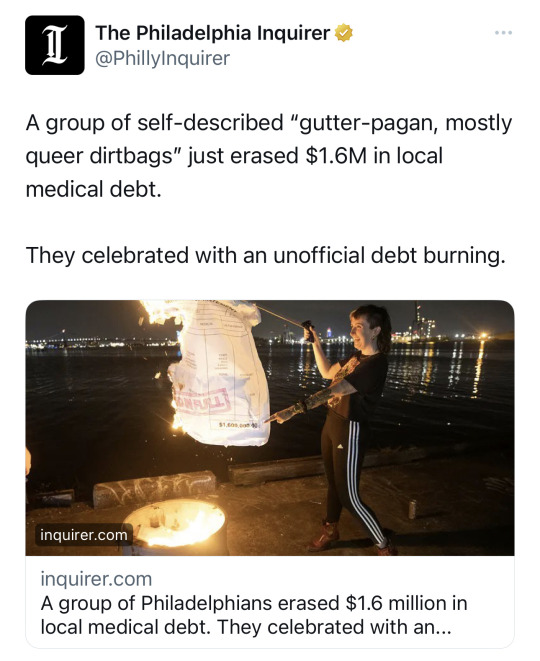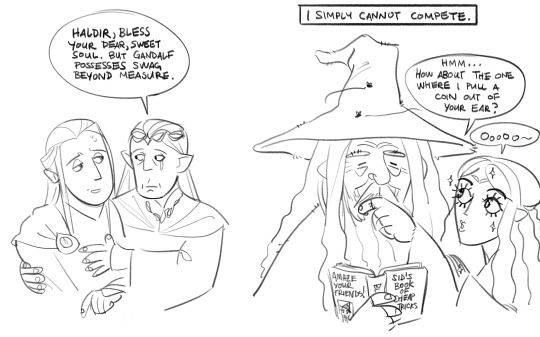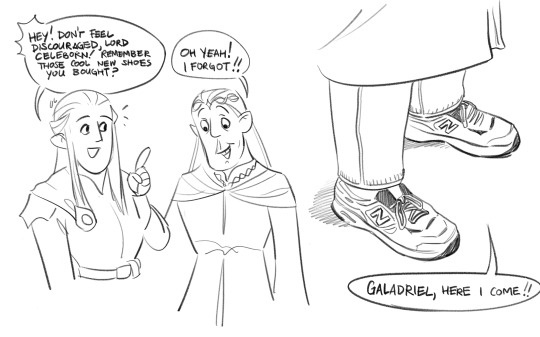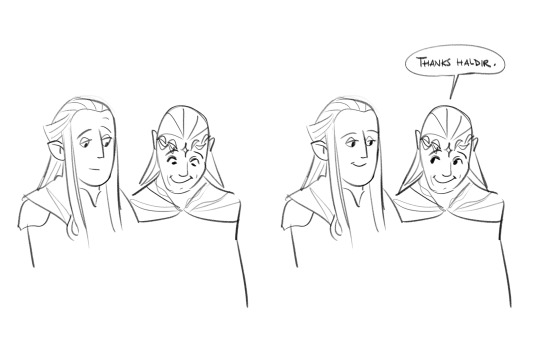Text
contrary to popular belief Namo is the overprotective brother who’s like ‘look at her you made her cry’ and Irmo is just like ‘smh she’s always crying; that’s basidally her job’
#Silm shitpost#namo#mandos#irmo lorien#nienna#the valar#silm#the silmarillion#silmarillion#silm fandom#the silm fandom#the silm#tolkien#valar
10 notes
·
View notes
Text
If Fingon was a fruit he would be a pineapple send post
#Silm shitpost#Fingon#findekano#pinepples#i relish that tag#silm#the silmarillion#silmarillion#silm fandom#the silm fandom#the silm#tolkien
4 notes
·
View notes
Text
My hot take is that Maedhros and Maglor would not be all that suprised that Silmarils burned them - they know what they did.
But. They would, completely irrationally, be suprised that Silmarils burned their brother.
1K notes
·
View notes
Text

Absolutely obsessed with this illustration of Sauron in The Fall of Númenor. Would you just look at this sleekit bastard! You can practically hear the wheels going round and round in that foul little mind of his. :D
25 notes
·
View notes
Text
A Tale That Wasn't Right
Belated entry for @silmarillionepistolary
2406 words, M, Maedhros/Fingon
Warnings: violence but not very graphic
On Ao3
NOLDÓRAN ARCHIVES PROJECT
MANUSCRIPT 26328-lambe
Records of the Hearing Convened by Finwë Noldóran Concerning the Incident Occurred Between Two Highborn Eldar
Editor’s note: Perhaps one of the most fascinating manuscripts among the royal records, 26328-lambe has been classified for Ages. Only now, well into the Fifth Age, it has finally been released to the public.
Certainly, the reluctance to publicize these records must be due to the scandalous subject matter and the involvement of highly recognizable figures of the Years of the Trees. We shall refrain from speculations as to the identity of the involved parties and redact or change several identifying details as per the request of King Arafinwë.
The manuscript is also distinguished because of the considerably biased notes of the unnamed scribe, possibly one who did not continue their service for long. Despite their unconventional approach to their role, we have this scribe to thank for the preservation of the very first draft of the records.
Without further ado, we invite the reader to peruse the records and draw their own conclusions.
At the second hour of the Mingling of [precise date omitted], the Noldóran convened a private hearing, concerning an altercation between two highborn Eldar that has been brought to the Noldóran’s attention.
Present at the meeting
Finwë Noldóran
[redacted], tavernkeeper of the tavern [redacted] in Tirion
Finwë Noldóran’s humble scribe
Noldóran: Let us begin. Tavernkeeper, I would hear all that occurred between [title omitted] N and [title omitted] F.
Tavernkeeper: Where should I begin, lord?
Noldóran: When did you first notice their presence at your tavern?
Tavernkeeper: Immediately, lord. It was the first time such highborn lords visited my establishment. [Title omitted] F was the first to arrive. He sat in a corner and ordered [drink name omitted to avoid identification]. I did not know how to make it. He kindly explained it to me. He was three cups in when [title omitted] N joined him.
Editor’s note: Henceforth, the omission of the titles will not be mentioned. Let it be noted that the involved parties were addressed appropriately throughout the hearing.
Noldóran: Did you notice any enmity between them when N arrived?
Tavernkeeper: Not at all! F did look ill-pleased at seeing N, but I assumed it was due to N’s tardiness. N whispered something into F’s ear, which seemed to appease him.
Noldóran: How so?
Tavernkeeper: After, well, the whispering, F smiled and ordered more drinks. [Drink name omitted] for himself again and simple mead for N.
Scribe’s note: Only a son of [redacted] would drink such an abomination.
Noldóran: Could you perhaps hear parts of their conversation?
Tavernkeeper: I would not presume to eavesdrop on a conversation between such highborn lords.
Noldóran: Not even if it was to the benefit of your king?
Tavernkeeper: Alas, the tavern was busy, lord, and they spoke in very low voices, so I missed the beginning of their discussion.
Noldóran: So you mean to say you heard the ending, the part before the incident.
Scribe’s note: If this tavernkeeper does not hurry up and tell the interesting parts, I may die of boredom in front of the King and embarrass myself and my entire family.
Tavernkeeper: They stayed long after the tavern emptied. I must say, lord, they had drunk quite a lot, so their voices were raised. I did not eavesdrop on purpose.
Noldóran: I do not fault you, tavernkeeper. Do recount the argument arising between N and F.
Editor’s note: To make for easier reading, the argument is relayed here directly. Readers must trust that they shall miss only a great amount of hesitation by the tavernkeeper to report to the King the exact details of the conversation and the number of drinks N and F consumed meanwhile, which is high.
F: It has always been your greatest fault!
N: Loyalty?
F: Loyalty to the wrong person.
N: Who would the right person be then?
[long silence]
N: It is not in your nature to avoid a question.
F: Why speak if you know the answer well?
N: You cannot fathom what you demand of me.
F: Only to do the right thing. Is it too much to ask for?
N: Ever you have shown nothing but contempt to my father. You do not know him as I do.
F: You are blind to his faults.
N: I am not. But, unlike you, I am familiar with his virtues, too.
F: Any virtue he possesses pales before his vices.
N: Is it not unfair to speak so when you have made no attempt to understand him?
F: He deserves none.
N: Do I? Do it for my sake. I would do it for you. I have done it for you.
F: It was not for me. You had taken a liking to my father long before I was born. He is easy to love.
N: How naive for someone who claims to know others with no effort. You say I am blind to my father’s faults, yet you see none in yours.
F: He has none.
N: I can name one. Just now, he made you lie to me and to yourself.
F: My father is blameless in this!
N: Of course, only mine is to blame for everything.
F: What is the use of seeing his faults if you do nothing about them?
N: What do you expect me to do?
F: I told you. The right thing.
N: Why did you summon me here? We are only repeating ourselves again and again. We shall never agree.
F: If only you were less stubborn.
N: I am no more stubborn than you. Why should I be the one to relent? What will you sacrifice?
F: Have I not sacrificed enough? Have I not endured your father’s scorn without protest? Have I not stayed by your side through all of it?
N: What a great sacrifice it must be for you to stay by my side! Have you overlooked that I did the same? Or perhaps you believe it is easier for me?
F: If it is not, then we both know who to blame. I suppose I must be grateful you have gathered enough courage to even agree to speak with me. Have you told your father where you will be?
N: Have you told yours?
F: You give me no answer as expected, but I shall answer you. I have not only because my father has no perverse need to keep watch over his children’s every move. He is not cowardly enough to look for betrayal where there is none.
N: You will not call my father a coward! Have I ever treated your father with such disdain?
F: Why would you? He does not deserve it.
N: But mine does?
F: Doesn’t someone who belittles others to hide his own weakness, who is craven enough to forge weapons in secret, deserve to be treated with contempt?
N: Do not speak so, I warn you.
F: What will you do? Leave and shun me as always? Disregard my letters and flee when I try to visit? Run to your father to assure him of your loyalty, so you can stave off his bitterness and suspicion for a while longer?
Noldóran: Do go on! What happened then?
Tavernkeeper: I hesitate, lord, for even now, I can scarcely believe it.
Noldóran: Nevertheless, I would hear it.
Tavernkeeper: After those words, N, well, he struck F.
Noldóran: Struck him?
Tavernkeeper: He did. A mighty fist against F’s jaw.
Noldóran: Are you certain that it was N who struck first?
Tavernkeeper: Quite certain, lord. I must say I had lost count of the cups they had both drunk by that point.
Scribe’s note: Liar! It does not sound like N. Although, the son of [redacted] would have deserved it.
Noldóran: Please continue. Spare no detail.
Tavernkeeper: The blow was strong enough that F fell from his chair. They both looked as astounded as I was. I thought N wished to offer a hand to F, but instead, he turned back and moved to the door. That was when F pounced on him and brought him down. They tumbled together, grappled, and shoved each other against the walls. They damaged five chairs and two tables during their brawl as well as all the cups and plates that were on them. F twisted N’s wrist in an attempt to restrain him, but N wrapped F’s braids around his other hand and wrenched him away. They were on the floor once again by then. N tried to rise, but F took a broken chair leg and hurled it towards N. It hit the mark rather painfully. In response, N threw a half-empty goblet at F, which missed his head but drenched his hair in ale.
Editor’s note: The sketch of King Finwë with his head in his hands is presumably drawn by the scribe.
Noldóran: What then?
Tavernkeeper: They must have exhausted themselves because they remained lying on the floor for a while. I was afraid to approach them, but I also hesitated to leave in case they resumed their fight.
Noldóran: Did they?
Tavernkeeper: No… They did something else.
Noldóran: …what was it?
Tavernkeeper: F sat and helped N up. N said something to F in a very low voice. F answered. I could not hear the words. And then they… They kissed, lord.
Noldóran: A kiss between friends?
Tavernkeeper: I would not say so.
Scribe’s note: This does sound like N.
Noldóran: Did you see what happened after the so-called kiss?
Tavernkeeper: No, lord. I hurried to leave. That was all I saw, I swear.
Noldóran: Thank you, tavernkeeper. I believe it goes without saying that what we have spoken about must remain within the walls of this hall. Of course, you shall be compensated generously for your losses. Scribe, there is no need to record this part.
Scribe: As you command, Noldóran.
Tavernkeeper: No word shall leave my lips, lord.
Noldóran: You have my gratitude.
Scribe’s note: Future generations of the Noldor, I shall have your gratitude for making and preserving these records. Glory to the House of [redacted]!
***
Fingers run between disheveled braids, smoothing them with gentleness in stark contrast with the violence they had yanked at them. Inhale. The faint perfume of almond oil wafts through the heavy scent of ale. They do not mix well. Maitimo says so.
“Who could have guessed?” Findekáno says dryly.
Maitimo’s fingers continue their tender way through Findekáno’s braids. Findekáno closes his eyes, his head turning where Maitimo guides him, willingly this time.
Languidly, he raises a hand and runs it – feather-light – across Maitimo’s face, across his left cheekbone where a hideous bruise is already forming.
“Does it hurt?” he asks.
“Yes.”
Findekáno leans forward and retraces the path of his fingers with his lips, leaving a faint trail of red across Maitimo’s cheekbone. Maitimo’s eyes fall shut, his breath stutters. Findekáno takes Maitimo’s hand – the same one that split his lip open – and kisses the bloodied knuckles. Maitimo’s fingers entwine with Findekáno’s – a movement so familiar and practiced that it is almost an instinct.
Findekáno raises his head and presses his lips to Maitimo’s, but the moment Maitimo deepens the kiss, Findekáno pulls back with a hiss.
“It is bleeding again,” Maitimo says with dismay.
He takes a dampened rag and taps it tenderly against Findekáno’s lip, careful to avoid touching his bruised jaw. But Findekáno leans into his hand, his eyelids fluttering in something between pain and relief.
Maitimo undresses him, runs his fingers along his shoulders, caresses his chest, strokes his hips. Bruises are late to bloom and hard to find on Findekáno’s skin, unlike Maitimo, who is already painted red and purple. But Maitimo knows exactly where he had hurt Findekáno – an elbow to the sternum, a closed fist beneath the ribs, shoulders slammed against the edge of a table too many times.
Maitimo explores Findekáno’s body with hesitant touches, soothes his aches, brushes his fingers against the bruises. Does not apologize. The sound of Findekáno’s harsh breathing grows louder and louder until he grabs Maitimo’s hands and turns in his arms.
He bares Maitimo from the waist up in pained, hurried movements as if there is no time left. Maitimo winces when he raises his arms to allow Findekáno to disrobe him.
“Oh!” Findekáno exclaims, staring at the fresh bruise that covers most of Maitimo’s lower rib cage.
“Even inebriated, your aim is true,” Maitimo says.
Findekáno sinks down. Raises a hand to the bruise, then lets it fall. Leans forward and traces the uneven edges of the bruise with his lips, warms it up with his breath, soothes it with his tongue. Does not apologize.
Findekáno begins the work of relieving Maitimo of the rest of his clothing. Maitimo’s hands shake, then his knees, then his shoulders. Findekáno’s lips slide lower, ghost over Maitimo’s groin.
“You did not hurt me there,” Maitimo says, his voice coming out as bruised as his body is.
“How fortunate I still had some sense left,” Findekáno says.
Maitimo laughs, and for the briefest of moments, all pieces fall into their places – Findekáno before him, teasing him gently, making him laugh – so familiar and so right. But the tremors of laughter reach every aching place, reminding him sharply of what they did.
“Wait,” he says.
“Hush,” Findekáno says, holding Maitimo by his unhurt hip.
Maitimo looks down at Findekáno, kneeling on his bruised knees, looks at Findekáno’s swollen lip and beaten face.
“Who would do this?” he asks.
Findekáno draws back.
“Who hurts someone he loves and cherishes in such a cruel way?” Maitimo asks.
“You do,” Findekáno says. His gaze slowly passes over all the angry red marks he has left on Maitimo’s body. “And I.”
Maitimo sits before him.
“Will you swear it will never happen again?” he asks. “Can you give me your word that you will not do it again?”
Findekáno is silent for a moment.
“You cannot either,” he says then.
“No.”
“It is not right.”
“No.”
Findekáno leans his forehead against Maitimo’s. There is a small but painful bump on it from hitting it against a chair. It aches.
“You should leave,” Findekáno says.
“I should.”
“So should I.”
“Yes.”
They sit before each other, bare and bruised, hand in hand, skin to skin, amid the broken cups and chairs, amid the destruction they caused. None moves.
42 notes
·
View notes
Text
Maedhros built up a high pain resistance from Angband; particularly to the burning sensation. Considering how low he thinks of himself, it’s likely he expected the Silmaril to burn him. He didn’t think he was redemptive, he thought I can take it.
Part of why Maedhros acts so viciously is because that’s how life treated him. I can take it if my brothers die. I can take it if I’m damned for eternity. I can take it if everybody thinks I’m a monster.
He’s proud, and he’s suffering. He won’t back down, he will succeed or be martyred.
#Alexis rants#Swear I could hear my English teacher snapping at me to avoid passive voice while writing this#I have been thinking thoughts#Something so miserable and ghastly about someone who says ‘I know this is wrong#and I don’t care’#And the anarchic part of me is saying it’s justice#because this pain has been wrought against him too#What does it matter they’re innocent? So was he#He’s miserable and he wants the valar’s attention#And in many ways he was the one who finally got them to listen. Earendil only had the Silmaril because Dior was slain. Maedhros’ plan worke#He spilled blood and ruined his soul#That part that just wants to burn everything is doing it as a cry for help: ‘see what you did to us’#It’s piteous but beautiful#Shall I go on#Maedhros#silm#the silmarillion#silmarillion#silm fandom#the silm fandom#the silm#tolkien#maitimo#maitimo nelyafinwe#russandol#war of wrath
28 notes
·
View notes
Text
Galadriel, youngest child of a youngest child, crosses the Helcaraxe and the borders of Doriath, wins the affections of the king’s great nephew and becomes close in the counsel of the queen — she is probably the second most powerful woman in first age middle earth.
Her cousins are flabbergasted.
#Also people don’t talk about this enough? Like yes Galadriel disappears from the story#But only after ascending the political ladder and securing her position as part of the sindarin royal family#Ambitious bitch#(affectionate)#Galadriel#Artanis#silm#the silmarillion#silmarillion#silm fandom#the silm#the silm fandom#tolkien#Silm shitpost
25 notes
·
View notes
Text
i have an extremely important question for everyone: if you were able to put one (1) gay kiss in the lord of the rings movie trilogy, what scene would you put it in
#Lot of people saying put it in rotk#obviously for drama that would make sense buttt#Thing is samfro is really the only meaningful couple to give a gay kiss in the movies#and Frodo is so wasted in rotk the idea of him engaging in romance isn’t really? Anyway#So I’d probably put it at the bit where Sam and Frodo just broke the fellowship and it’s all dramatic and shit#It was SUCH A KISS MOMENT#thwyre looking at each other and everything and they’ve already been all spicy on the boat
49 notes
·
View notes
Text
Thought Fingolfin was wearing a hoodie for a solid moment and had this hilarious image of preppy modern au nolofinwe accosted by his geeky LARPing brother in the way to college, can’t even
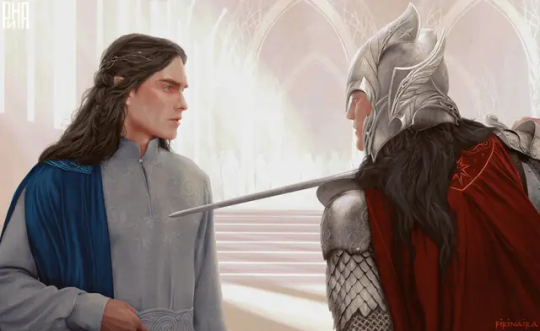
'This is sharper than thy tongue, half-brother!'
Do not use without my permission, please
#Silm shitpost#where is my life anymore#nolofinwe#fingolfin#feanor#good art#silm art#silm au#silmarillion
555 notes
·
View notes
Text
Turgon is the token straight kid in that family.
Of Arakáno and his Ammë.
Argón : Ammë, are you homophobic?
Anairë : Number one, you're gay.
Anairë : Number two, I have a lesbian daughter.
Anairë : Number three, I wacth Rapaul's drag race.
Anairë : How can I be homophonic, idiot?
9 notes
·
View notes
Text
So what if the Valar foresaw that a balrog would be reawakened, and sent Glorfindel back as a precaution against this?
Then when Elrond is picking the company that it is Glorfindel’s life’s purpose to be in he gets upped by some silvan weirdo.
#Olorin coming back to the valar like ‘I fought a fucking balrog’ and the valar being like#‘Where was glorfindel?’ And learning that he was just chilling in rivendell#Looking at each other like shit that wasn’t supposed to happen#Guess we gotta send this bad boy back then and apologise to glorfindel for all the inconvenience#Also glorfindel sending letters (?) to ecthelion like ‘miss you but there’s another moody dark-haired one called erestor#He reminds me of you’#silm#the silmarillion#silmarillion#silm fandom#the silm#the silm fandom#tolkien#lotr#Glorfindel#gandalf#the valar#balrog#tolkien legendarium#middle earth
41 notes
·
View notes
Text
Maglor the ‘mighty singer’ has formidably been named ‘gold cleaver’ when he’s actually the shortest and least threatening of Feanor’s children and I live for this.
#Silm shitpost#silm#the silmarillion#silmarillion#the silm#silm fandom#the silm fandom#maglor#makalaure kanafinwe#makalaure#kano#me thinking linguistics is funny
15 notes
·
View notes

